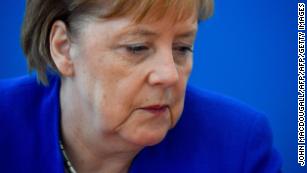Europe's migration policies are not so different from Trump's
The European response to the Trump administration's "zero tolerance" of illegal migration and especially the controversial separation of children from their parents has largely been one of outrage and disgust.
"We do not share the same model of civilization," said French government spokesman Benjamin Griveaux in June. "Has ever a US president displayed such a total lack of empathy, such a deficit of common human decency?" thundered Britain's Observer newspaper in an editorial.
But to the US President, it's Europe that's got it all wrong. "Crime in Germany is way up," he tweeted in June, although the statistics show otherwise.
"Big mistake made all over Europe in allowing millions of people in who have so strongly and violently changed their culture!" Trump added -- a wild assertion.
Many Europeans take umbrage at Trump's attacks. But even if they don't subscribe to his "zero tolerance" approach to migration, European governments have also become much tougher in handling migrants, asylum seekers and even minorities already resident.
More than 1,000 would-be migrants and refugees are known to have died at sea this year trying to reach Europe. But there is no coordinated rescue response; the European Union has left it to merchant ships and nongovernmental organizations to pick up those adrift. And two of those NGO vessels have been detained in Malta.
The Europeans' focus is on pushing the problem back to the Middle East and North Africa. Italy is bolstering the Libyan coast guard; more migrants are being sent back to already crowded detention centers in Libya.
German Chancellor Angela Merkel, fighting for her job, has proposed setting up "reception centers" in several North African states, most of which have already said they'll have nothing to do with the plan. She has also offered to help Bulgaria, Croatia and Slovenia improve border security.
Those who do make it to Germany would be confined for up to 18 months in what Berlin euphemistically calls "anchor centers" -- large camps close to the border -- while their asylum requests are processed.
Meanwhile, the number of migrants crossing the Mediterranean declined sharply after 2015 from 1.07 million to 360,000 in 2016 and 172,000 in 2017, according to the International Organization on Migration. So why the drastic measures, if the flow of migrants has already ebbed?
Some governments, notably Merkel's, are reacting to pressure from populist movements and right-wing parties for whom immigration is a dominant issue. The motive, simply, is political survival. Other governments -- in Hungary and now Italy -- are made up of those populist and right-wing parties. The result is a battery of laws making asylum harder, repatriation quicker and detention camps more common.
'We can do this'
It was Merkel who opened Germany to a large number of migrants and refugees who had crossed the Mediterranean in 2015, with words that soon became a catchphrase: "Wir Schaffen das" or "We can do this." Nearly a million arrived in Germany, many of them fleeing the violence in Syria. "Refugees Welcome" was the slogan at football stadiums and town halls. At the time, Trump said what Merkel had done was "insane. They're going to have riots in Germany."
He was wrong about the riots, but 2016 saw a sharp increase in violent attacks on migrants in Germany. The mood has soured since that summer of compassion three years ago; and not just in Germany.
A poll in the autumn of 2016 found that in eight European states, including Britain, France, Germany and Italy, more than 70% agreed that people had become "more negative about immigrants or other groups that are different to them" than previously.
That doesn't mean a majority are negative; it means that, to a growing minority, immigration has become the most important issue. This has benefited the parties of the radical right, such as the People's Party in Austria, Fidesz in Hungary and the Five Star Movement in Italy.



Comments
Post a Comment